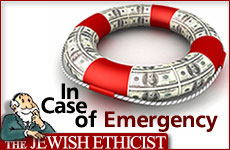 Vampire Weekend's Surprising Jewish Stories
Vampire Weekend's Surprising Jewish Stories


4 min read
4 min read
11 min read
4 min read
I don't want to give my money to charity – I might need it one day.
Q. I'd like to give charity, but I'm afraid I might end up in need myself. Does this show a lack of faith in God's providence?
A. Your thinking seems to go something like this: Normally, even if I have enough for ongoing needs, I would want to accumulate some reserves for unforeseen needs. If God commands me to give charity with my spare money instead, He must be promising that misfortune will not strike. So your worries about what setback the future may bring are compounded by your concern that maybe your faith is not whole.
There are two answers to your question. The first, which we will discuss this week, is that Jewish law acknowledges that setting some money aside for unexpected needs, within measure, can also be considered an essential expense. (Next week we will give an additional approach.) Here is an important source for this rule:
The Shulchan Arukh (authoritative Code of Jewish law) states that eminent Torah scholars are exempt from many communal levies. Even if the Torah scholar has to work for a living and can't devote all his time to study, he is considered to be devoting all his free time to learning as long as he works only "enough for his livelihood, and not in order to enrich himself." (1)
The highly authoritative commentary of Rabbi Shabtai Rapaport states that "enough for his livelihood" includes putting some money aside for emergencies. "It is obvious that various mishaps can occur suddenly to a person, such as illness and others, which will require him to make large outlays, and there is no set limit to these."
Of course this approach can be taken too far, and no person would give charity. The Talmud also tells us:
Rabbi Eliezer the Great says: Anyone who has bread in his basket and asks, "What will I eat tomorrow?", that person is of small faith. (2)
However, putting aside a certain amount for predictable emergencies (as Rabbi Rapaport explains) does not indicate a lack of faith but is rather part of our everyday responsibility to provide for household needs.
The great recent sage Rabbi Moshe Feinstein was asked a similar question regarding insurance. Someone asked him if buying insurance didn't display a lack of faith in God's providence. Rabbi Feinstein replied:
Insurance is just like any other matter of commerce and the like that one does for a livelihood for himself and his children . . . And if a person wants to leave for his old age or for a legacy, he needs God to provide him with whatever is the most effective way according to accepted ways in the same way he would provided for by a miracle, which he may not merit and also is not appropriate [since a person should strive to support himself by natural and not supernatural means.] And since God gave us the wisdom in recent generations to provide us with the insurance business in the world . . . this is a good and appropriate thing even for good God-fearing people who trust only in God, for it is He Who gave us the thought to provide for ourselves, and buying insurance is also the counsel of God, to buy insurance and to trust in God that he will be able to continue to pay the premium. (3)
Your desire to put a little money aside for possible urgent needs is perfectly legitimate. Trust in God's providence doesn't mean that we don't need to earn a living or put aside money for future needs; it means that we trust in Him to give us the ability to do so. However, we shouldn't be save up money for mere speculative future needs if this prevents comes at the expense of giving a suitable amount of charity for quite urgent needs of others.
SOURCES: (1) Shulchan Arukh Yoreh Dean 253:2 (2) Babylonian Talmud Sota 48b. (3) Responsa Igrot Moshe Orach Chaim II:111
Send your queries about ethics in the workplace to jewishethicist@aish.com
The Jewish Ethicist presents some general principles of Jewish law. For specific questions and direct application, please consult a qualified Rabbi.
